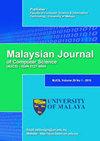AREA BASED EFFICIENT AND FLEXIBLE DEMAND SIDE MANAGEMENT TO REDUCE POWER AND ENERGY USING EVOLUTIONARY ALGORITHMS
IF 1.2
4区 计算机科学
Q4 COMPUTER SCIENCE, ARTIFICIAL INTELLIGENCE
引用次数: 0
Abstract
Evolutionary algorithms are stochastic that reflects the biological evolution to reach optimal solutions to optimization problems where mathematical techniques may fail. Demand Side Management (DSM) are designed to reduce electricity consumption or to shift the consumption from peak to off – peak hours depending on consumers’ lifestyle and behaviour. DSM is a flexible consumer driven activity in which the consumer has voluntarily changed his energy usage pattern during peak demand so to maintain the reliability and stability of power system and the performance of an electrical grid. In this aspect we have explored the impact of an efficient and flexible DSM which can reduce the power demand and energy in different areas like rural, urban and villa there by utilizing the device power rating and its activation time. The defined problem was solved with evolutionary based – genetic (GA), particle swarm (PSO) and differential evolution (DE) optimization algorithms. Simulation results show the better outcome in terms of power demand and energy reduction and the results are compared to know the better performing algorithm as on applied to DSM.基于区域的高效灵活的需求侧管理,使用进化算法减少电力和能源
进化算法是随机的,它反映了生物进化,以达到数学技术可能失败的优化问题的最优解。需求侧管理(DSM)旨在根据消费者的生活方式和行为,减少电力消耗或将电力消耗从高峰时段转移到非高峰时段。DSM是一种灵活的消费者驱动活动,消费者在高峰需求期间自愿改变其能源使用模式,以保持电力系统的可靠性和稳定性以及电网的性能。在这方面,我们探索了高效灵活的DSM的影响,它可以通过利用设备额定功率及其激活时间来减少不同地区的电力需求和能源,如农村、城市和别墅。使用基于进化的遗传算法、粒子群算法和差分进化算法解决了定义的问题。仿真结果表明,在电力需求和节能方面取得了更好的结果,并对结果进行了比较,以了解应用于DSM的性能更好的算法。
本文章由计算机程序翻译,如有差异,请以英文原文为准。
求助全文
约1分钟内获得全文
求助全文
来源期刊

Malaysian Journal of Computer Science
COMPUTER SCIENCE, ARTIFICIAL INTELLIGENCE-COMPUTER SCIENCE, THEORY & METHODS
CiteScore
2.20
自引率
33.30%
发文量
35
审稿时长
7.5 months
期刊介绍:
The Malaysian Journal of Computer Science (ISSN 0127-9084) is published four times a year in January, April, July and October by the Faculty of Computer Science and Information Technology, University of Malaya, since 1985. Over the years, the journal has gained popularity and the number of paper submissions has increased steadily. The rigorous reviews from the referees have helped in ensuring that the high standard of the journal is maintained. The objectives are to promote exchange of information and knowledge in research work, new inventions/developments of Computer Science and on the use of Information Technology towards the structuring of an information-rich society and to assist the academic staff from local and foreign universities, business and industrial sectors, government departments and academic institutions on publishing research results and studies in Computer Science and Information Technology through a scholarly publication. The journal is being indexed and abstracted by Clarivate Analytics'' Web of Science and Elsevier''s Scopus
 求助内容:
求助内容: 应助结果提醒方式:
应助结果提醒方式:


